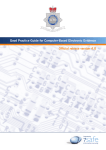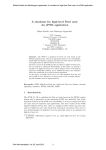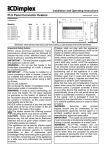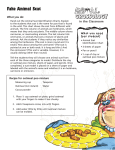Download Tenants Newsletter January 2015
Transcript
January 2015 Onchan District Commissioners Tenants Newsletter WELCOME Welcome again to the latest Tenant‟s Newsletter for residents and prospective tenants of Onchan District Commissioners. As promised in previous Newsletters, we will keep you up to date with any changes that we are made aware of from central government regarding housing management, so please see the article inside. As you are aware, the government have decided that social housing rents are to increase by 5% for the 2015/16 year. The Commissioenrs were against this and favoured a 0% rise, and have made their position clear to the Minister for the Department of Health and Social Care. Unfortunately, the Department has chosen to impose the increase without further discussion. A copy of the full press release issued by the Board of Onchan Commissioners is in this edition. The Commissioners are also aware that the transfer of services from central government to local authorities will have an impact on the rates, which form a part of the overall weekly social housing rent. The Authority has managed to make savings in its operating costs equivalent to a 2p rate, but this has been overtaken by the costs transferred, and the rates will increase for all households in Onchan. A quick look forward to our planned works for 2015: after four years of successful completions on major projects, this will be a year of consolidation. The only project due to commence is one involving window replacements at Springfield Court, complimenting the boiler replacements in that complex and resolving an outstanding issue. There are other major projects at the planning stage, such as the redevelopment of the old Fine Furnishings site in Marion Road, but these will be unlikely to start in the next 12 months. We are still continuing with our property inspections, and the information gained will help us decide on the priority projects for the next five years, we appreciate your help in completing these. Finally, we are obliged to have the assets of the Commissioners valued every five years for our accounts, and the social housing stock has to be included. This will involve our agent visiting representative houses in our estates to confirm the internal dimensions, layout, construction and repair state. The visits will not take long, and you will be contacted in advance if your property has been chosen. Your help again would be appreciated. BURGLARY UPDATE from Police Deputy Clerk Inside this issue: Social Housing Update 2 Pests and Vermin 2 Rent 4 Why is there a deficiency payment ? 4 The current situation 4 The Department’s response 6 Conclusion 6 Fire Safety—Top 10 tips 8 Fire—First Avenue 9 Home Insurance 9 Commissioners’ Surgery 9 Parking Issues 10 Parking Enforcement 10 Yellow Lines 10 Dropped Kerb & Double parking 10 Obstructive Parking 11 Home Stay—ODC Policy 11 When Your boiler has no pressure 12 The Police have asked us to update you with regard to their operations on the spate of burglaries. They would like to focus the public on the information that they are calling with. They are pleased with the amount that is coming in, but there are a few things that will really help. The first one is the sound of BREAKING GLASS. If you hear a window going in, call the Police on 999. If it is something happening there and then - ring 999. The sort of stuff the Police are interested in are people up the side of houses, in places they shouldn't be, odd callers to the door, etc. Secondly, nobody knows your neighbourhood like you. It‟s things that are out of place that the Police are looking for. What is different when you look out of the window? If it doesn't look the way it should, then give the Police a call. It might be something that just doesn't sit right, and if so ring the Police via 631212. But if it looks like someone is definitely breaking into a property, then 999 every time. If it is something that has happened, and you think the Police should know about then call them on 631212. Finally - please let the Police deal with things. Don't unnecessarily confront individuals. Keep observations on what is happening and be prepared to stay on the line when you ring the Police. Tell them what is going on, and they will be there on the hurry-up. Also, remember the official Constabulary social media is the ONLY place that you will get properly analysed FACT on what is actually going on. https://www.facebook.com/pages/Isle-of-Man-Constabulary-Media-Page/ Tenants Newsletter SOCIAL HOUSING UPDATE The future of local authority housing continues to be a matter of debate, and the Department of Health and Social Care are still moving toward the creation of regional housing bodies. These are intended to be dedicated housing authorities outside the current local authority structure, but overseen by the Department of Health and Social Care as regulators. Onchan Commissioners remain convinced that the separation of housing from the local authority accountable to the residents of the district will bring about not only a reduction in service but an increase in costs, which will ultimately be passed on to the tenants through further rent increases. It will also increase the burden on the Island‟s taxpayer‟s through the creation of a new regulatory system requiring more civil servants. Onchan Commissioners are working to keep their housing management with the local authority as they believe that the service provided can be demonstrated as cost effective and accountable. This year looks set to be a turbulent time, so tenants and housing applicants will be kept informed of developments as they occur through these newsletters, the Onchan Commissioners web site and Facebook page. PESTS AND VERMIN With the colder weather, there is an increase in calls with regard to pests and vermin around the estates. In order to help you deal with these problems and who you should contact, please see the following information. Mice and Rats Mice and rats spread disease through their urine and droppings. They also cause a lot of damage to your home and furnishings, and can chew through electrical wires, increasing the risk of fire and electrocution. Mice are very common, particularly during the wintertime. However, you can keep them under control yourself using traps or poison, which you can buy in most DIY stores. You can also contact the Government Environmental Health Division for further advice. Creepie Crawlies How can I prevent infestation? To keep creepy crawlies out of your home, there are several simple precautions you can take: Make sure your home is always clean, especially in the kitchen. Wipe down kitchen surfaces and sweep or vacuum floors regularly to remove any trace of food. Store food in sealed containers. Clear up any water spillages or leaks, as these can encourage cockroaches and silverfish. Keep the kitchen bin closed and empty it regularly. Put rubbish out in properly sealed bags or bins. If you have a garden or yard, don't let it become overgrown, as this provides a good home for mice and rats. Don't dump old furniture, mattresses or other rubbish in the garden or yard, for the same reason. Call the Commissioners if you need old furniture removed, or take it to the Civic Amenity Site yourself. If you feed garden birds, don't put food out in the evening and always use a bird table. Don't put bird food on the ground as this can attract mice and rats. If you have a compost heap, don't put cooked food on it. Again, this attracts rats. Block up any holes in the brickwork, roof, skirting board and floorboards, to prevent mice and rats getting into your home. You should contact the Property Maintenance Officer for advice. Page 2 What if the pests are coming from next door? You may suspect that your neighbours are responsible for attracting pests into the area, because, for example, they have a lot of rubbish piled up in their garden or yard. In this case, your first step should be to talk to your neighbours and ask them to deal with the problem. If this doesn't work, please contact the District Surveyor at Onchan District Commissioners, who can serve a notice on your neighbours ordering them to clear up the infestation and carry out any repair or cleaning work necessary to prevent further problems. If they don't comply with the notice, the Commissioners can deal with the problem , and charge your neighbours for the work. Minimising pest attraction. PETS – The presence of pets can provide a source of food and suitable breeding site for pests. Uneaten pet food will provide a food source for cockroaches, and attract flies which may lay their eggs in the residues. Even if this is subsequently removed the eggs may hatch and develop within the waste bin. Rodents will be attracted to un-eaten food, particularly if left overnight, and also to bird seed which may be discarded by cage birds. Sleeping and resting areas used by pets should be regularly vacuumed and the bedding washed to prevent fleas becoming established. WILDLIFE – Feeding wild birds should be carried out sparingly, providing only enough food for their needs. Suspended bird feeders should be used where possible and regularly repositioned to avoid the build up of residues and bacteria on the ground below. No food should be thrown on the ground as this will attract vermin. COMPOSTING – If garden waste and green food scraps are to be composted an enclosed receptacle of wood or plastic should be used. To prevent rats burrowing from below a solid base or weld mesh floor should be provided. Only materials of a vegetable nature should be placed in the composter. Drainage in the base and a cover on top will reduce the attractiveness to flies. PEST CONTROL You can deal with certain problems yourself, but for more serious outbreaks, you should contact the Department of Environment, Food and Agriculture, Pest Control Department or a local pest control specialist. No matter how clean your home, you can still suffer from an infestation by bees, wasps, ants, mites, silverfish, bedbugs, fleas, rats or mice. The pest control service exists to ensure that the Isle of Man is kept free from the nuisance of pests and the damage they can cause. For further advice, contact Pest Control: Telephone: (01624) 685894. Treatments for public health pests (rats, mice, wasps and cockroaches) are free of charge in all domestic premises. Page 3 Tenants Newsletter RENT Owing to the current interest in social housing rent levels, Onchan District Commissioners would like to provide some background to their views on the subject. These comments have already been given to the Department of Health and Social Care and to all MHKs. Members of the Board believe that there should be a much deeper conversation between all Local Authorities, their tenants and the Government regarding the future provision of housing in the Isle of Man, particularly with respect to affordability. There is a lot of information here but the Commissioners believe it is necessary in order to gain an understanding of these complex issues. Why is there a ‘deficiency payment’? In 1943, Onchan Village Commissioners stated that they would prefer social housing to be treated as a national matter, undertaken by central government. There was some support for this view: “I say we have the financial capacity to provide these houses; our finances are overflowing, to such an extent that we don't know what to do with the money.” S.Norris MLC, TYNWALD COURT, FEBRUARY 6, 1945. 305 Tynwald did not agree. Responsibility for providing houses after the war was to remain with the local authorities. Rents for the new houses were proposed to be set at one-sixth (17%) of a general labourer‟s basic pay. “We have got to visualise that we are not always going to live in the happy land of to-day, when the demand for labour is greater than the supply, and perhaps high wages. That is in the future. We have to build houses at rents which the working man can pay; otherwise we will again revert to slumdom…” A.J.Teare MHK, TYNWALD COURT, FEBRUARY 6, 1945. 305 Local Authorities could not afford to build the houses, without major costs to the rate-payers, if the rental income was to be set at this level, so the government in their resolution of 6 th February 1945 agreed that the deficiency – the difference between annual cost and annual income – would be funded two-thirds by government, with one-third coming from the local authorities‟ rates. This was later amended (17 th April 1946) to ¾ and ¼. “(b) The authority concerned to submit an estimate of the rents which may reasonably be expected to be obtained from such houses” Thirty years later, on 9th July 1974, Tynwald increased their deficiency payments to 100% and it was agreed unanimously with local authorities and the Local Government Board that, rather than having different rents for each housing scheme (newer houses costing more), all the houses within an authority should be put into one pool and rents levelled out, one to help the other. Public housing is supposed to be „affordable‟ housing. Our current social housing rents should not be set on the amenity value of a particular property nor on private market rents, but on the average working wage; this was the intention of public housing from the outset. The UK Department of Communities and Local Government continue to stress that rents must be determined with regard to local incomes, stating that “Renting is affordable if it is no more than 25% of gross household income”. In fact, Guernsey‟s housing system limits social housing rents to between 14% and 25% of gross income. Page 4 Information from: http://www.sevenoaks.gov.uk/services/environment-and-planning/parking The current situation Onchan District Commissioners are concerned that rents for social housing have increased by approximately 30% over the last three years, and they requested a moratorium for the next financial year. They also felt that this was a view held by a number of other social housing providers and were concerned to note that DHSC Minister Howard Quayle has referred to “growing costs” without identifying the source of this alleged increased burden. The Board noted that there was no increase for inflation nor was there an uplift of the monetary value of the administration allowance paid to local authorities, which remains at the 2011/12 level. In real terms, this represents a reduction rather than an increase in costs. The source of the growing costs appears to be the Department‟s Housing Division. The 2012 report from the David Tolson Partnership stated “It may also be noted that raising the rents by 30% would mean that DSC Housing would have no deficit (indeed would generate a small surplus) due to its low levels of debt.” This would indicate that the Tolson projection for DSC housing (now DHSC housing) was for there to be a credit balance accrued from the rental income from that point onwards 1. Is this, perhaps, the reason why the DHSC is so keen to increase rents? Government Accounts suggest that, following the Tolson Report, DHSC rental income actually increased by 46%, from £3.7m in 2012 to £5.4m in 20142, although it also appears that their administration costs have risen 250% over the past 3 years to £2m 3. The DHSC has generated a surplus of £4.5m from its own social housing stock over the past 3 years4. This is not because the Department is efficient, it is because the Department took £12m from General Revenues (the taxpayer) in 2012/13 to fund its own capital programme 5 – an option, obviously, not open to local authorities, who must borrow from the Banks and pay back the capital with interest. The recent reporting of the Government‟s rent increase, due to „increasing deficiency payments‟, seems to imply that this is required because of Local Authority inefficiency, and that is certainly the impression gained by the public. The burden of deficiency payments was not forced upon central government by inefficient local government. The payments were devised and introduced by Tynwald as a method of ensuring that public sector housing would be built by local authorities and let out at an affordable rental for the lower paid members of our society. It was an accepted expense on the taxpayer in order to provide decent housing. Government approves all capital borrowing and all housing schemes and knows, in advance, what the effect will be upon the General Revenue Account. It is deceptive for the DHSC to try to claim that deficiency payments are the fault of the local authorities, and it is disreputable that the DHSC demands that we impose rent increases, without means-testing, where the costs are sustainable under the existing rental income and deficiencies are not claimed. This was never the intention of Tynwald (nor was it subject to any consultation). There is no evidence of „increasing deficiency payments‟. Historically, deficiency payments have been falling. They went up in 2011 and 2012 due to construction of properties in Ramsey and Port Erin, but have again been falling since that time and are now about the same as they were in 2010. Minister Quayle has quoted a figure of £6.25m as the deficiency on public housing. That figure is actually his Department‟s budget estimate for 2013/14. The total claim from local authority accounts in 2013/14 was £4.4m split roughly 50/50 social/sheltered. The net income from DHSC houses balances off almost 50% of the total deficiency payment. The actual cost to Government is therefore £2.46m. It is, perhaps, again relevant to note at this point that the DHSC administration cost for the Housing Division for 2014 was £2.03m. Onchan District Commissioners have been able to complete a major refurbishment project on 118 homes at a cost of over £4.25 million, a property conversion into five new flats, and a property acquisition for future development, all without claiming any subsidy from central government funding for our general housing stock. This is on top of our normal repairs and renewals work, and ongoing administration of the services. Our administration cost is £91.5k. The Commissioners feel that their prudent financial management is not being reflected in the application by the DHSC of an “across the board” rent rise, and that our tenants are suffering an unjustified financial hardship because of the DHSC‟s policies6. Taking Ramsey as an example; to reduce Ramsey‟s deficit (£1.3m) to zero their rents would need to increase by a further 57%. Does every local authority therefore have to raise their rents by 57%? Page 5 Tenants Newsletter RENT continued The Department’s response Howard Quayle MHK, Minister for the Department of Health and Social Care, responded to the above comments with a defence of his Department (see endnotes), rather than addressing the issue of tenants‟ difficulties with respect to affordability. He has turned down the offer of a meeting with the Commissioners: “The rent increase for 2015/16 is set at 5% and all Housing Authorities are required to implement the increase. Given this, I believe there is little to be constructively gained by meeting to reiterate the issues covered above.” However, in his letter dated 9th January 2015 Mr Quayle admits that “It would be very short sighted of any Political administration, either local or national, to believe public sector housing will ever be fully self-funding and there is a clear need for on-going public subsidy arrangements to support the sector.” If that is the case, then why is the Department attempting to make public sector housing fully self-funded from tenants‟ rents? Conclusion In answer to a question in Tynwald on 20th January 2015 Minister Quayle said “Public sector rents are achieving more realistic levels…” By what measure are they „more realistic‟? The Department‟s continued reliance on market values as a benchmark for social housing rents is neither fair nor equitable, nor is it what the originators of social housing wanted when they introduced the scheme of deficiency payments. To quote Minister Quayle, “Firstly, we must decide whether the priority is to balance the budget or to protect the vulnerable.7” He appears to have chosen to balance the budget. NOTES The following figures were researched and reported to the Onchan Board in May 2013. The rent values given here do not include LA rates, Government Rates, Burial Rates, Sewerage charge etc. These additional charges add about 17.5% to the total. For 2015-16, the average rent, all properties including rates, will be £94.72 (£410.45 per month). The highest rent including rates will be £124.25 (£538.41 pm) _______________ Public housing is supposed to be „affordable‟ housing. The Department of Economic Affairs show average manual weekly earnings (m+f) of £478.20 in 2012. One-sixth of this (17%) would be £79.70 per week. 163 of our properties are currently within +/-10% of this figure. Onchan‟s highest rent is £96.33, or 20% of the average weekly wage. The Department of Communities and Local Government in the UK say, „Renting is affordable if it is no more that 25% of gross household income.‟ In fact, Guernsey‟s housing system limits public housing rents to between 14% and 25% of gross income. Obviously, our rents are within this guideline for working tenants. Page 6 NOTES continued The situation is not substantially different for those who are retired. 42% of our tenants are over 65 years of age. A surprising 73% are over 55 years of age. (Demographically, 30% of the island‟s total population are over 55 and 18% are over 65). 43% of applicants on the waiting list are over 55 (and 40% are under 29). These are not wealthy people. Research by the Prudential Insurance Company in 2013 suggests that the annual pension from all sources for all persons is an average of £15,300 per year. That suggests £3,825 (25%) is an affordable rent - £73.56 per week Research in the Isle of Man reveals that the average annual pension for a retired male manual worker is £5,658.35 (Whitley Council 2011); that two-thirds of health workers get a pension of under £7,000 and that half of the civil service get a pension of under £7,000 (IoM TUC 2011). On the assumption that these people receive the full state pension of £110 per week and the Manx supplement of £53 per week, their total pension from all sources is comparable to the Prudential Co figure. Their affordable rents would be in the region of £67.95 to £74.40 per week. Onchan‟s average 2bh rent 2013 is £70.21per week. Average rent, all properties, is £72.89 per week. This suggests that our current social housing rents are pitched correctly. Not on the amenity value of a particular property, but on the average working wage; this was the intention of public housing from the outset. The UK Department of Communities and Local Government continue to stress that rents must be determined with regard to local incomes. Unfortunately, DHSC Ministers are determining rents by how quickly they can reduce the government‟s deficit. Minister Robertshaw said that public housing rents are not market led. But isn‟t valuing on the basis of amenities and modernity a market solution? Isn‟t basing social rent on private rent levels a market solution? And, against what Tynwald decided in 1974? Yes, there will be people and families who can afford to pay more, perhaps much more, than is suggested here, (and this was recognised as a problem way back in 1974), but such a decision should be based on means testing. It is not fair to increase rents for the vulnerable, the pensioners and others on fixed incomes just because a very small proportion of tenants (about 5% according to Minister Robertshaw8) have a greater income than most. Equally, there will be those who cannot afford to pay even those rents suggested here and who must be financially supported by the DSC. Whitley Council state that the average female pension is £2,334.94. Assuming, again, full state pension (which for most women is unlikely), their rent would be 35% of their gross income. Of what benefit is it to increase their rents? Could Onchan raise rents to the maximum „affordable‟ level of 25% of average manual workers wage, i.e. £119.55? Yes, of course. This could be achieved by increasing the rent 10% per year for 5 years. But the question remains, why? The result for Onchan would be a surplus of £750,000 per year whilst the majority of tenants would be paying 40%58% of their gross income in rent. That is not fair and equitable. Page 7 Tenants Newsletter End Notes 1 Mr Quayle says “The statement was made as an illustration of how much of an increase would be required to maintain the properties with the investment programme identified at that point in time” ODC: This infers that every time investment is made the rents have to go up. 2 Mr Quayle says “The £3.7m 11/12 DSC rental income is less the deduction of rates paid out whereas the £5.4m 13/14 rental figure is before the deduction of rates paid…an increase of 30.4% rather than the 46% as you have stated” 3 Mr Quayle claims this is not accurate because the Housing Division functions are much wider than simply public sector housing management and maintenance. The costs associated with these functions are included in the Department‟s budget. ODC would have to question why those „wider functions‟ are being funded from public sector rents? 4 Mr Quayle says that “much of this relates to Housing Deficiency monies payable to Local Authorities which are accrued at year end and are subject to the timings of individual Authority‟s claims” ODC responds: the figures that make up the £4.5m are taken directly from the Isle of Man Government financial statements. As the accounts of both the Local Authorities and the Government are prepared on an accrual basis, then there should be no timing issues between them. 5 Mr Quayle says “the Department is required to pay loan charges to the Treasury for this facility” 6 Mr Quayle says “access to good quality housing is a basic human need and it is the Government‟s strategic responsibility to ensure this is delivered consistently across the Sector. It is not – nor should it be – dependent on the individual financial viability of each of the Islands 16 Housing Authorities.” ODC comments: it is not dependent on the financial viability of the housing authorities. It is dependent upon the Government‟s ability to provide deficiency payments. 7 Tynwald Q23, 20th January 2015 8 This figure was subsequently put in doubt by Minister Quayle and reported by IoM Newspapers “Government figures on council house incomes wrong” on 24th September 2014. , “The figures I have been provided with are different from those that the previous minister had been working to. We need to go away and make sure everything is correct.” TOP 10 TIPS TO MAKE YOUR HOME A SAFE HOME Page 8 Fire—First Avenue As some of you are probably aware, one of our tenants unfortunately suffered a house fire. Thankfully nobody was injured. However, this is a stark reminder of how much your family life can be affected by the damage caused from the smoke and fire. These pictures of the damage are used with their permission. Bathroom Smoke Damage Living Room Smoke Alarm melted by the heat of the fire We would like to remind you of the following:- HOME INSURANCE The Onchan District Commissioners are responsible for the insurance of the building of local authority owned housing. The tenant is responsible for insuring their own belongings. DO YOU HAVE HOME CONTENTS INSURANCE? The cost of such insurance is very cheap and provides peace of mind, covering items such as furniture, electrical appliances, personal belongings, carpets, clothes and so on. It may even provide cover for redecoration and replacement of broken glazing units. If you do not have home contents insurance cover, please consider doing so. You will be glad to have such cover, in the event of an incident at home, such as fire or water damage, because the replacement of home contents can be very expensive indeed. Commissioners’ Surgery Changes Just a reminder, that you can talk to two Commissioners in private regarding any issues to do with the Onchan District or any housing issues you are experiencing. The Surgeries are changing from a “walk-in” type to an appointment only basis. Appointments can be made to meet with the Commissioners on the first Tuesday of each month at the Commissioners Office from 6.30 p.m. Please ring (01624) 675564 in advance to make your appointment. Page 9 Onchan District Commissioners Hawthorn Villa, 79 Main Road, Onchan, Isle of Man, IM3 1RD Andrea Dentith , Tenant Liaison Officer Tel: 675564 Fax: 663482 email: [email protected] Tenants Newsletter PARKING ISSUES We have recently received many phone calls over issues to do with inconsiderate parking. For your information, there are powers available to issue Fixed Penalty Notices can be issued for parking offences under the provisions contained in the Road Traffic Regulation Act 1985, and Parking Controllers regularly visit Onchan. To avoid you being fined, please see the following article to help avoid these parking issues. Parking Enforcement Parking enforcement and the associated parking penalties are an important part of managing the roads and car parks. Good on-street parking controls and restrictions can improve safety and reduce congestion. Certain serious on street offences, such as parking on the approach to a pedestrian crossing or causing an obstruction, are enforced by the Police. A Fixed Penalty Charge, commonly referred to as a parking ticket or fine, can be placed on vehicles parked irresponsibly and in contravention of on-street and off-street parking restrictions. Yellow Lines Yellow lines are provided to help traffic movements and improve road safety and are painted where there is a need to control or restrict parking and to prevent obstructions on the highway. There are two main types: Double yellow lines usually mark lengths of road where there is no waiting at any time. Single yellow lines usually indicate a short restricted period such as certain days of the week or certain hours of the day which is shown on information plates on posts regularly spaced along the roadside. Dropped Kerb and Double Parking Blocking dropped kerbs and double parking causes obstruction to pedestrians, especially those with mobility problems, and double parking often results in delays for other road users. Dropped kerb enforcement applies to pavement crossings where the kerbstone has been lowered to make a gentle ramp for pedestrians, pushchairs or wheelchairs. It will not apply to dropped kerbs across driveways and access to property as this remains the responsibility of the police. Double parking is when one vehicle is parked alongside another but it can also be where a vehicle is parked more than 50cm from the pavement, kerb or edge of the road. The rules apply to all drivers, including Blue Badge holders, and there is a penalty for both offences . Page 10 Obstructive Parking The offence of obstruction only occurs when a parked vehicle actually prevents access or egress, and only at the time that someone is coming in or out. If it is still possible to get in or out, then that is not technically obstruction. Nor is it 'obstruction' if the person blocked in or out is not actually wanting to go in or out at that time - "I will be going out later, so that car is obstructing me..." does not apply. Obstruction also depends on the vehicle that is being obstructed - for instance a fire engine or ambulance on to the road may need much more space than someone in a car and are much more likely to be obstructed. Would you want them obstructed if they were coming to your house? If the answer is “No”, then please think carefully about where you park. Obstruction can also be caused by vehicles parking on pavements. If the pavement is blocked, then that can be viewed by the Police as obstruction - a good test is "could someone in a wheelchair or with a pram walk past without having to go in to the road?" It is an offence to obstruct someone's access or to block the pavements or roads, and any incidents should be reported to the Police Headquarters through their non-emergency number Tel: 631212. HOME STAY—ODC Policy As you are aware the Department of Economic Development and IOM Tourism operate a T.T. Homestay Scheme. In their guidance notes it states that “If you are a tenant, whether it is a Commissioners’ property or privately owned, you should ensure that you have permission from the landlord to sublet your household.” A copy of the Guidance Notes of the Scheme are available from Regency Travel. Onchan District Commissioners require their tenants to write to the Commissioners and request permission to take part in the T.T. and Festival of Motorcycling homestay scheme. Where approval is given, the following conditions will apply: that the property be formally registered with Regency Travel on behalf of the Isle of Man Government for T.T. and Festival of Motorcycling Homestay purposes; that the tenant ensure that their own house contents insurance is in place, and that their insurers are aware of the participation in the scheme; that the tenant continues to stay at the property for the duration of the homestay; approval would be limited to T.T. and Festival of Motorcycling fortnight only. If you accommodate visitors without the Commissioners’ approval you are in breach of your Tenancy Agreement and your tenancy may be terminated. It is in your best interests to write and seek the Commissioners’ permission before allowing any persons to reside in your property other than those named on your occupancy forms. Page 11 Onchan District Commissioners Tenants Newsletter When your Boiler has no pressure A loss of water pressure is a good indicator of some common issues that arise with boilers. Low pressure is relatively easy to diagnose, as most boilers have a built-in pressure gauge. Sometimes, it‟s possible to correct water pressure yourself Understanding water pressure Constant water pressure is essential to the efficient functioning of your boiler system. Pressure in most modern combination boilers is maintained by cold water flowing from the water mains supply through a mechanism known as the „filling loop‟. What causes a drop in pressure? A number of things can cause pressure to drop. It may be possible that if you have bled your radiators recently, it may be that pressure was lost then. Checking your pressure gauge Check the water pressure gauge or indicator, which is typically on the front of your boiler. If the central heating system pressure needle is not between 1 and 2.5 bar and below 0.5 bar the error code E1 19 will flash on the display. The water pressure in the central heating system is indicated by the pressure gauge. With the system cold and the boiler not operating the pressure should be at least 0.5 bar. During operation the pressure should not exceed 2.5 bar, and will normally be between 1.0 and 2.0 (Fig 1) A Pressure of 3 or greater indicates a fault (Contact the Surveyor‟s Department to arrange for an engineer to call.) The Minimum pressure for correct operation is 0.5 If the pressure falls below 0.5 (Fig 2) Error Code E 1 19 will be shown on the display. (Fig 1) Normal Pressure (Fig 2) requires re-pressurising (Fig 3) Fault Filling Loop (installations may vary) To Re-Pressurise the system This procedure is for the optional filling loop kit when fitted. Look at the boiler underneath. There will be two taps at the end of the copper pipes. Do not operate these taps yet. Your installer will have left a braided hose (the filling loop) connected to the central heating return and the cold water main. Carefully open the taps and check the boiler pressure gauge. Once the needle on the gauge is above the 0.5 mark both taps can be closed. (Make sure you have turned the taps off) How to tackle lost pressure Each boiler will come with specific instructions about its pressure system. Check your user manual to see if you can re-pressurise your boiler yourself. If you have noticed repeated drops in your boiler pressure, make sure you check the gauge regularly. A drop in pressure is a good indication that there is a problem with your boiler. You may also find instructions on the rear of your boiler control panel. However, if your boiler panel needs tools to remove it, don‟t touch it – contact the Surveyor‟s Department to arrange for an engineer to call. Likewise, if you continue to have pressure problems after re-pressurising your boiler according to the user manual, our Surveyor‟s Department can arrange for an engineer to call to diagnose and repair the problem. Page 12

































